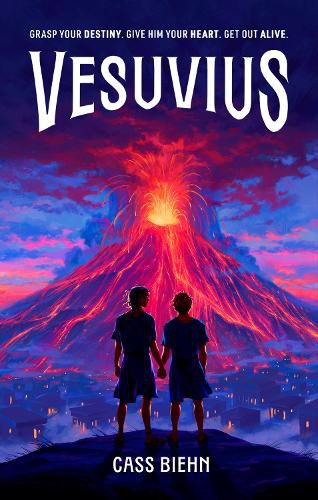Vesuvius by Cass Biehn

Cass Biehn, in Vesuvius, catapults the reader straight into the first century world of Pompeii immediately before the cataclysmic eruption of Mt Vesuvius. The reader is immersed into the tumultuous, religious, political and cultural world of that time and place. Not only is the ground heaving but deadly political machinations and commercial enterprises are seething away alongside old temples dedicated to various gods.
Into this seamy cauldron, two young boys enter. Felix, is a talented young thief, who has mysterious flashbacks to his origins which he tries to tamp down. The book opens as he dodges through the crowds with a stolen priceless relic- the supposed helmet of the god Mercury. Loren is a temple attendant, also of unknown origins, who can foresee the future but can't exactly read or comprehend what he sees. Neither boy seems to know their origins or why Felix has always featured in Loren's dreams or what Felix's ties to the helmet mean or what the nightmarish dreams mean. As the tremors grow, as the city is cast into confusion and chaos, as treachery and death is around every corner, the boys must figure out what their fates are as their longing for each other grows in a simmering, slow-boil romance. The narrative has the rumbling, impending feel of catastrophe about to explode mirroring the mountain behind the town.
Biehn writes well. The plot and action is absorbing. The characters are well developed. Vesuvius could well fit onto an "additional reading" list for the study of Roman history which can be a topic studied in year seven and later in the high school years. Biehn states in the Author's Note that..."Although heavily researched, I'm the first to admit that Vesuvius takes some creative liberties with history". Nonetheless, Biehn has created an integrated picture of what Pompeii could have been like at the time based on her own study. Thus the young history scholar may find that reading Vesuvius makes the period come alive in the way of all good historical fiction.
Biehn has also created a book that looks at the effects of early childhood trauma and the way that it shapes people. She considers queer people in history and queer readers of today. She reaches out to contemporary readers not only through the story of Vesuvius with its message of hope and struggle in the overcoming of difficult odds but also through the list of resources for people in need of support - in Australia-Q Life (+contact details) in the end papers and through the message in the Author's Note.
Themes: Queer romance, Vesuvius, Magic, Myth, Historical fantasy.
Wendy Jeffrey